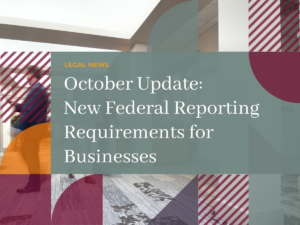New Federal Reporting Requirements for Businesses – October Update
As we reported last month, beginning January 1, 2024, most US businesses will have to report information about their “beneficial owners” – that is, the individuals who actually own or control a company – to a US agency known as the Financial Crimes Enforcement Network (“FinCEN”).
This new reporting requirement is a result of the Corporate Transparency Act enacted by Congress in 2021. The required report is called the “Beneficial Ownership Information Report” (“BOI Report”). The businesses required to file a BOI Report are called a “reporting company.” A separate BOI Report must be filed for each “beneficial owner” of a reporting company. The report will provide information about all individuals who directly or indirectly control or own a reporting company, whether a corporation, LLC, or limited partnership (and any other entity created by the filing of a document with the Secretary of State). One purpose of the BOI Report is to minimize opportunities to hide or benefit from ill-gotten income or to use ownership loopholes to avoid reporting income to the federal (and state) government.
The definition of a “beneficial owner” for whom a report must be filed is both broad and complicated. A “beneficial owner” is an individual who meets at least one of two criteria:
(1) the individual exercises substantial control over the company; or
(2) the individual owns or controls at least 25% of the ownership interests of the company (“Beneficial Owner”).
While FinCEN has not yet identified exactly which positions within a company are considered a Beneficial Owner, it is likely to include officers, directors, and any other individual who can vote on or otherwise influence decisions regarding the business or transactions involving the business. Currently, under the tentative FinCEN regulations regarding BOI Reports, there are five exceptions to the definition of a Beneficial Owner:
- A minor child, provided that a parent or guardian’s information is reported;
- An individual acting as a nominee, intermediary, custodian, or agent on behalf of another individual;
- An individual acting solely as an employee of a reporting company in specified circumstances;
- An individual whose only interest in a reporting company is a future interest through a right of inheritance; and
- A creditor of a reporting company.
Every US business must file a BOI Report for each Beneficial Owner unless the business qualifies for an exemption. Currently, there are 23 listed exemptions:
- Tax-exempt entity
- Entity assisting a tax-exempt entity
- Insurance company
- State licensed insurance producer
- Bank
- Credit Union
- Accounting firm
- Public utility
- Broker or dealer in securities
- Financial market utility
- Pooled investment vehicle
- Depository institution holding company
- Money services business
- Securities exchange or clearing agency
- Securities reporting issuer
- Other Exchange Act registered entity
- Investment company or investment adviser
- Venture capital fund advisor
- Commodity Exchange Act registered entity
- Governmental authority
- Large operating entity, defined as an entity that:
- Employs more than 20 full time employees in the US;
- Has an operating presence as a physical office in the US; and
- Filed a Federal income tax or information return in the US for the previous year showing more than $5 million in gross receipts.
- Subsidiary of certain exempt entities
- Inactive entity, defined as an entity that:
- Was in existence on or before 1/1/20;
- Is not engaged in active business;
- Is not owned by a foreign person, whether directly, indirectly, wholly or partially;
- Has not experienced any change in ownership in the preceding 12-month period;
- Has not sent or received any funds in an amount greater than $1,000, either directly or through any financial account in which the entity or any affiliate of the entity had an interest, in the preceding 12-month period; and
- Does not otherwise hold any kind or type of assets, whether in the US or abroad, including any ownership interest in any corporation, limited liability company, or other similar entity.
The above list of exempt reporting companies, along with other relevant information can be found at www.fincen.gov/boi-faqs.
While a business may be exempt, it appears likely that FinCEN will require even exempt businesses to file an initial report claiming exempt status. Further, when a business loses its exempt status, it must file the BOI Reports within 30 days.
This new filing requirement takes effect January 1, 2024. Thereafter, under the proposed rules, a BOI Report is due within 30 days for any new reporting company formed January 1, 2024 or after. For reporting companies in existence on or before December 31, 2023, the reporting company will have one year (until December 31, 2024) to file the required BOI Reports. For both new reporting companies formed after December 31, 2023, and existing reporting companies formed prior to January 1, 2024, the BOI Report must be filed electronically, using an online system which has not yet been launched.
Please note, the BOI Reporting requirement is new and the regulations are still under development, so details and rules are subject to change. We here at Murray Plumb & Murray are reviewing the FinCEN filing requirements to be able to assist you and your company in making all required filings. We will send further bulletins as more information becomes available. Stay tuned.
We will send further bulletins as we learn more. In the meantime, more information is available at https://www.fincen.gov/
